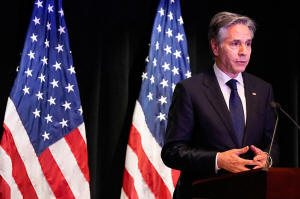|
Since 2022, U.S. officials have imposed sweeping controls on
which computing chips can be exported to China, cutting off some
sales from Nvidia, Advanced Micro Devices and Intel, among
others. Those controls followed earlier bans on shipping chips
to Huawei Technologies.
But U.S. officials have granted at least two U.S. companies -
Intel and Qualcomm - licenses to keep shipping chips to Huawei,
which is using an Intel chip to power a new laptop model. Two
Republican lawmakers earlier this week criticized the exemption
for Intel, but in the interview with NPR, Blinken highlighted
the device as a sign the U.S. was not trying to hobble China.
"I saw that Huawei just put out a new laptop that it boasted was
AI capable, that uses an Intel chip," Blinken told NPR host
Steve Inskeep while visiting Beijing. "I think it demonstrates
that what we're focused on is only the most sensitive technology
that could pose a threat to our security. We're not focused on
cutting off trade, or for that matter containing or holding back
China."
Intel and Qualcomm's licenses to sell to Huawei were granted
during President Donald Trump's administration and have remained
in place under President Joe Biden. Those companies' direct
competitors, AMD and MediaTek, have not received similar
exemptions, and neither the Trump nor Biden administrations have
explained why.
(Reporting by Stephen Nellis in San Francisco; Editing by Sandra
Maler)
[© 2024 Thomson Reuters. All rights
reserved.]
This material may not be published,
broadcast, rewritten or redistributed.
Thompson Reuters is solely responsible for this content.

|
|




